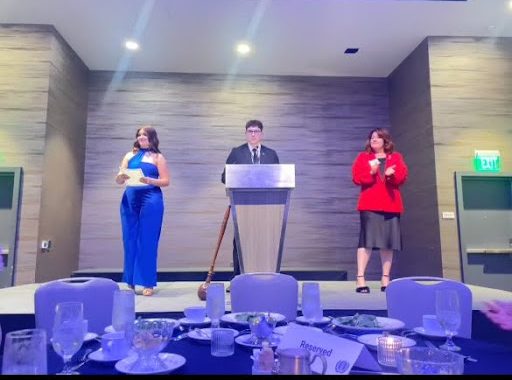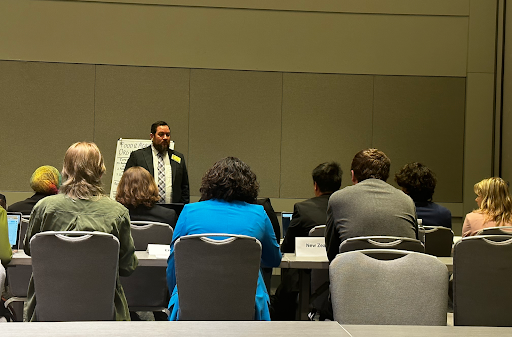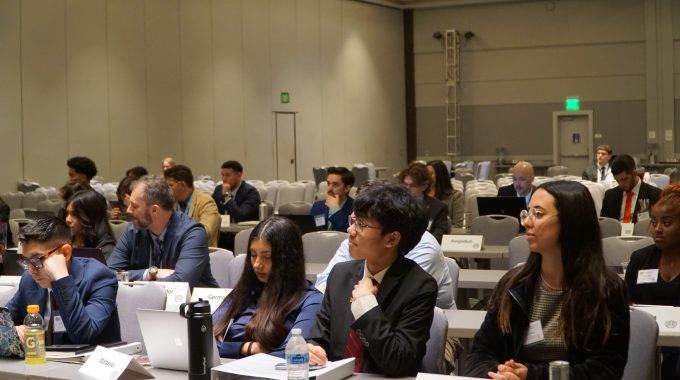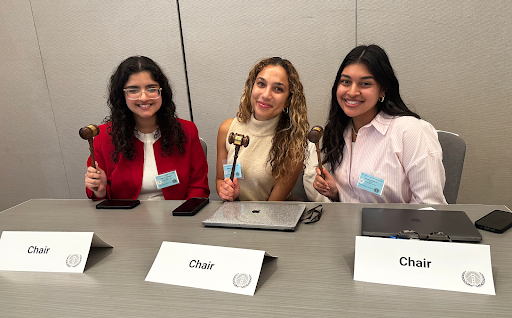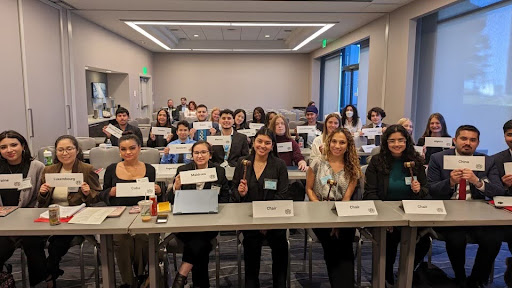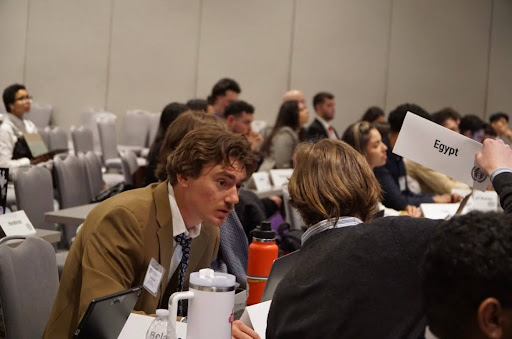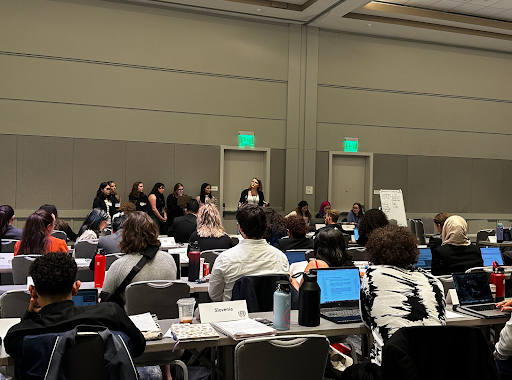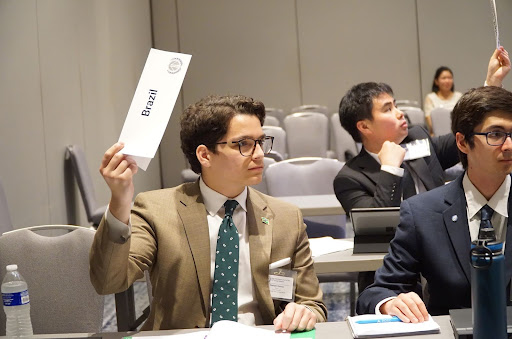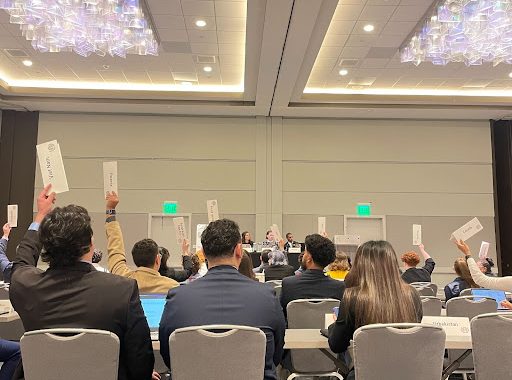Why Model United Nations?
As MUNFW commences its closing ceremonies, chosen delegates apart of special committee include, First Committees delegate from South Africa, Leah Jannetti, IOM delegate from Malta, Ashley Calkins, HRC delegate from France, Joe Alvarado, FAO delegate from Japan, Samuel Kahnke, and Security councils delegate from Russian Federation, Matt Forsgren. Each delegate approached the General Assembly with decorum, clearly and concisely explaining their resolution to the General Assembly. Congratulations to all delegates chosen to represent their committees, your committees and chairs saw your dedication and lust for the issues at hand.
As the 73rd MUNFW comes to a close I cannot help but reflect on key delegates and chairs dedication to maintaining their countries character, and accurately representing each delegation to their full extent. Delegate from Vietnam, Zayn Scott, was incredibly helpful and up-to-date on all motions and resolutions in the General Assembly. While in session he was professional, got down to business, and displayed attention to detail.
Delegates from Mesa Community College, Syria and Rwanda, showcased passion from their delegations perspective surrounding their designated agenda items in both General Assembly and IOM respectively. Each delegate had a unique take on the issues at hand, though they were often dissenters on issues, they properly pushed for their countries opinions on agenda topics.
I want to commend the African and Arab nations bloc, within the General Assembly and Security Council, on their consistent push for more fair and equitable representation of their nations within the UN and their status in international law and decorum. They pushed heavily for more representation of African and Latin nations in the Security Council, as well as recognizing disparities of technology between LDC’s and MDC’s. Delegate from Ethiopia, Amber Rae, asked many helpful questions and really got the conversation going around issues on the floor, in the General Assembly. Shout out to delegate from Egypt, Rolan Petty, for urging delegates part of the African Union to read Orientalism by Edward Said, speaking on Palestinian American dissent, stressing that ideas have been imposed on the western person that beliefs of African and Arab nations are backwards.
And finally Whittier College for their performance and portrayal of the United States and Myanmar. Each delegate provided me with fun moments while they gave speeches, one-on- one interactions during un-mod, and even within resolution clauses (I see you IOM). They upheld the United States personality as they delegated and were always prepared with facts and numbers. Myanmar delegate, Anna Gaber, collaborated well with other Southeast Asian countries within the General Assembly attempting to get their resolutions passed.
These are just a few examples of delegates showing their commitment to their countries and sadly I cannot shout everyone out but, delegate from Eritrea, Callum Mackay (GA), delegate from Canada, Sabrina Sandoval (IOM), delegates from Brazil, Evan Stein and Aivy To (GA), delegate from Saudi Arabia, Grant Latour (GA) and delegate from Russian Federation, Vlada Smoot (GA), were all standouts among the delegates I observed.
So why Model UN? Why do students subject themselves to a week of attempted manslaughter? Delegates spend long hours in shut rooms, with little time to feed the need for instant gratification through phone use in intense and oftentimes humid conditions. By the fourth day as I moved from room to room gathering what information I could on delegates in each room and their stances on policy and trying to decipher each clause within their drafted resolutions; each room greeted me with new temperatures, new topics, new smells (sadly) and overall new passion for international politics. Though, objectively, students are interested in Model UN because of how it may look on a resume, or experience they may receive for a job in the future, we are confined to such small spaces during conferences that thoughts of their own future don’t even cross our minds. Delegates throw themselves into conference entirely, becoming totally absorbed by the redaction of thorium from their resolution title, or advocating for continued debates on resolutions no matter how irritated their fellow delegates may be.
Model UN, specifically MUNFW, is more than a ‘simulation’ or a resume builder, it is a time where like minded students, with a passion for delegation and deliberation, can come together and truly be themselves. Though yes, the United States may think they are the coolest ones in the room, delegates really care about what they are doing, and won’t let anything get into the way, even if the world press wants an impromptu interview at 2 am in the atrium.
So why Model UN? Besides it being one of the hardest and entertaining weekends of your life, besides the drama cycling between unmoderated gossip chains (outside of the world press), Model United Nations is eye opening, informative and above all a place where all people regardless of their backgrounds, interests and relations are allowed. Model United Nations is educational yes but, since the conference is almost, if not entirely student led, students are allowed to make decisions and utilize skills they would otherwise not know they had the capabilities for. I never would have known how hard journalism is, or my skill level regarding this task if it was not for MUNFW.
For that reason I want to thank all delegates, chairs, advisors, and secretaries for your collaboration and willingness to be interviewed rather frequently for the sake of journalism.
This is World Press delegate of the Russian Federation, Michaela Appiah, signing off from a wildly successful and juicy conference.
Michaela Appiah
World Press Reporter
Weber State University

